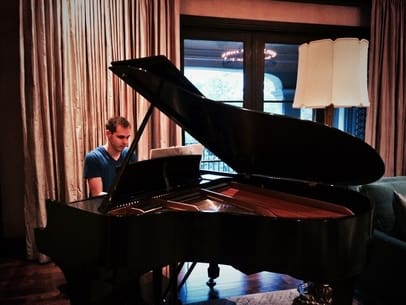JR Marlow is an arranger, choreographer, pianist and composer. Graduating from the award winning music program at Burbank High School, JR learned from the best of the best in the show choir community. After high school, JR started choreographing and arranging for several show-choirs nationwide, including Ankeny “Visual Adrenaline”, Burbank “In Sync”, American Leadership Academy “Evolution”, Carlsbad “Sound Express”, and Cedar Rapids Kennedy “Happiness Inc”. JR studied Composition and Arranging at Azusa Pacific University, and now lives in New York City where he continues to arrange and choreograph.

1. Please describe your basic setup. (Your technical setup as well as the physical space that you work in.)
I have a Mac desktop on a custom built table behind my electric piano. The table is custom built so it takes up as little space in the room as possible and is still able to hold the computer. I also have a mic that I bring out when I’m recording the demo track vocals. I use Sibelius for the notation, and ProTools for the demo tracks. And this setup is in the guest bedroom.
2. What is your process for brainstorming or inspiration-seeking as you start a new arrangement?
I usually don’t pick the songs I arrange. The director and/or choreographer tells me which song or songs they would like me to arrange in a stand alone number or a medley. Sometimes I get specific structure requests, and sometimes they let me decide. When I’m just given a song with no specifications, I first think about the structure. Beginning, middle, end – solos – dance breaks – etc. And if it’s a medley, which parts and lyrics of each song I want to go where. And that can take me a couple tries to get it right sometimes. Next step for me is transcribing the original song as close as I can, in the original key and everything, including patch sounds, backup vocals, horns, strings, drums. Everything that’s only the original track, just getting it all down. Then later I can embellish, add to, change keys, and actually voice it for the choir. After I finish notating the arrangement, I then export the midi into protools where I mix and record the demo track. And while recording the track, I sometimes will make changes to the vocals if they don’t sing as well as I thought when I wrote it in Sibelius. My sister, Ellen, sings the female vocals on my tracks and is very helpful with her musical intuition as well in making little changes to the vocals when we record.
3. What is your go-to snack and/or drink when arranging?
I very much enjoy my Diet Coke LOL
4. What is one thing you wish you would have known when you started arranging?
Three things:
- Not to stress over little things. Meaning don’t spend time worrying about things no one is going to hear when the group and the band perform the number live. Worry about the big things that actually make a difference. Structure and vocals are things to worry about, not the synth part or a quick horn lick.
- You are not smarter than the original creators of the song. Meaning I’ve learned that it’s best to transcribe the original materiel as close as possible, and then go from there. The writers and producers who created that song are extremely talented and smart and have put many more hours into it than you are going to. So soak all that up. The arrangement will be better if you do, rather than just following the chords and melody of the song and making up the rest on your own. Really listening and picking out exactly what every instrument is playing and getting it down.
- Be better that “good enough.” I actually heard this from Josh Greene, who was my mentor and a very accomplished show choir arranger. I was presenting an arrangement I had done to him and he questioned some of the things I did, and I said “well, I thought it was good enough”. And he replied, “let’s be better than ‘good enough’”. And I’ve never forgotten it. I have to constantly keep telling myself that when I’m working. And ask myself “is this just good enough? Or is it great?” And if it’s just good enough, I go back and keep working on it until it’s great.
5. What is your favorite shortcut or time-saving trick in your notation software?
I’m not sure if I have a favorite, but I’m most thankful for the transposing tool. Since I try to transcribe the original song as close as possible, and in the original key, it’s very handy and most helpful to be able to transpose the whole song into a different key that will sing better for a choir.
6. What is a favorite arrangement of yours?
it’s hard to pick a favorite, because I do have several that I like a lot. But I’m gonna say “I surrender/the great escape” and “Flying medley.” https://www.jrmarlow.com/best-sellers.html
7. How can people get ahold of you?
Website: jrmarlow.com
Email: jrmarlowjr@gmail.com





